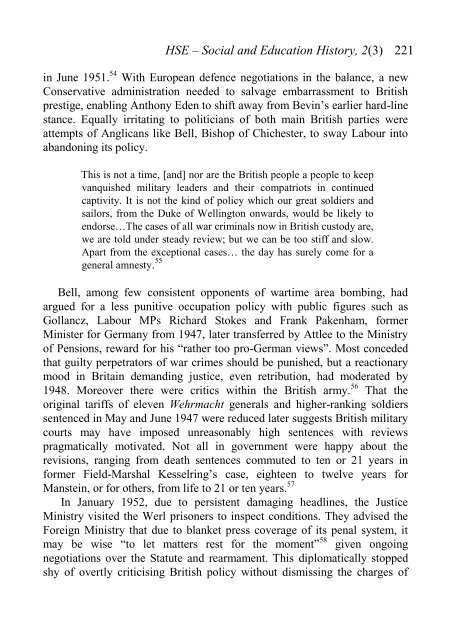Redalyc.British Justice in Western Germany, 1949-55
Redalyc.British Justice in Western Germany, 1949-55
Redalyc.British Justice in Western Germany, 1949-55
Create successful ePaper yourself
Turn your PDF publications into a flip-book with our unique Google optimized e-Paper software.
HSE – Social and Education History, 2(3) 221<br />
<strong>in</strong> June 1951. 54 With European defence negotiations <strong>in</strong> the balance, a new<br />
Conservative adm<strong>in</strong>istration needed to salvage embarrassment to <strong>British</strong><br />
prestige, enabl<strong>in</strong>g Anthony Eden to shift away from Bev<strong>in</strong>’s earlier hard-l<strong>in</strong>e<br />
stance. Equally irritat<strong>in</strong>g to politicians of both ma<strong>in</strong> <strong>British</strong> parties were<br />
attempts of Anglicans like Bell, Bishop of Chichester, to sway Labour <strong>in</strong>to<br />
abandon<strong>in</strong>g its policy.<br />
This is not a time, [and] nor are the <strong>British</strong> people a people to keep<br />
vanquished military leaders and their compatriots <strong>in</strong> cont<strong>in</strong>ued<br />
captivity. It is not the k<strong>in</strong>d of policy which our great soldiers and<br />
sailors, from the Duke of Well<strong>in</strong>gton onwards, would be likely to<br />
endorse…The cases of all war crim<strong>in</strong>als now <strong>in</strong> <strong>British</strong> custody are,<br />
we are told under steady review; but we can be too stiff and slow.<br />
Apart from the exceptional cases… the day has surely come for a<br />
general amnesty. <strong>55</strong><br />
Bell, among few consistent opponents of wartime area bomb<strong>in</strong>g, had<br />
argued for a less punitive occupation policy with public figures such as<br />
Gollancz, Labour MPs Richard Stokes and Frank Pakenham, former<br />
M<strong>in</strong>ister for <strong>Germany</strong> from 1947, later transferred by Attlee to the M<strong>in</strong>istry<br />
of Pensions, reward for his “rather too pro-German views”. Most conceded<br />
that guilty perpetrators of war crimes should be punished, but a reactionary<br />
mood <strong>in</strong> Brita<strong>in</strong> demand<strong>in</strong>g justice, even retribution, had moderated by<br />
1948. Moreover there were critics with<strong>in</strong> the <strong>British</strong> army. 56 That the<br />
orig<strong>in</strong>al tariffs of eleven Wehrmacht generals and higher-rank<strong>in</strong>g soldiers<br />
sentenced <strong>in</strong> May and June 1947 were reduced later suggests <strong>British</strong> military<br />
courts may have imposed unreasonably high sentences with reviews<br />
pragmatically motivated. Not all <strong>in</strong> government were happy about the<br />
revisions, rang<strong>in</strong>g from death sentences commuted to ten or 21 years <strong>in</strong><br />
former Field-Marshal Kesselr<strong>in</strong>g’s case, eighteen to twelve years for<br />
Manste<strong>in</strong>, or for others, from life to 21 or ten years. 57<br />
In January 1952, due to persistent damag<strong>in</strong>g headl<strong>in</strong>es, the <strong>Justice</strong><br />
M<strong>in</strong>istry visited the Werl prisoners to <strong>in</strong>spect conditions. They advised the<br />
Foreign M<strong>in</strong>istry that due to blanket press coverage of its penal system, it<br />
may be wise “to let matters rest for the moment” 58 given ongo<strong>in</strong>g<br />
negotiations over the Statute and rearmament. This diplomatically stopped<br />
shy of overtly criticis<strong>in</strong>g <strong>British</strong> policy without dismiss<strong>in</strong>g the charges of

















